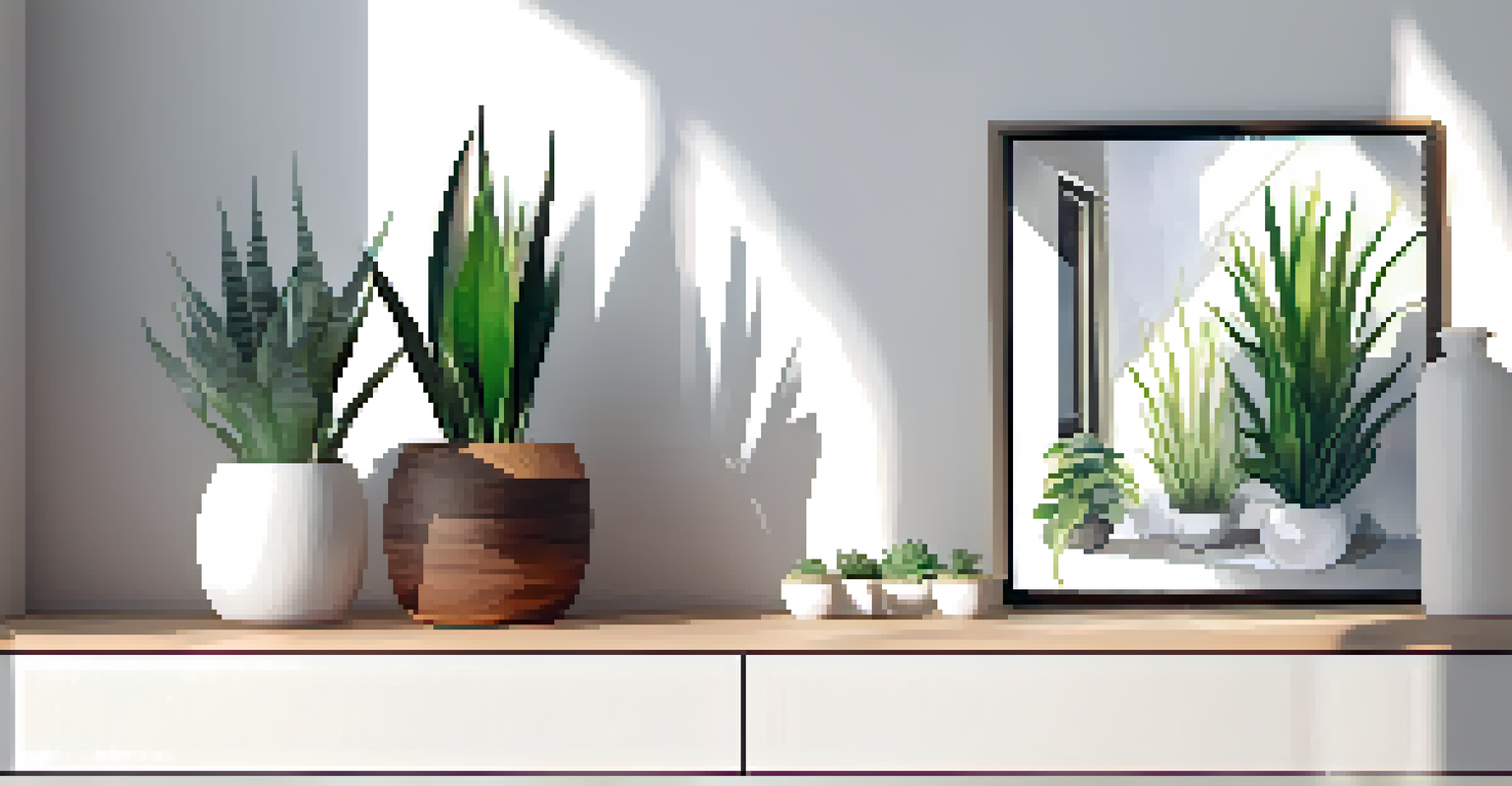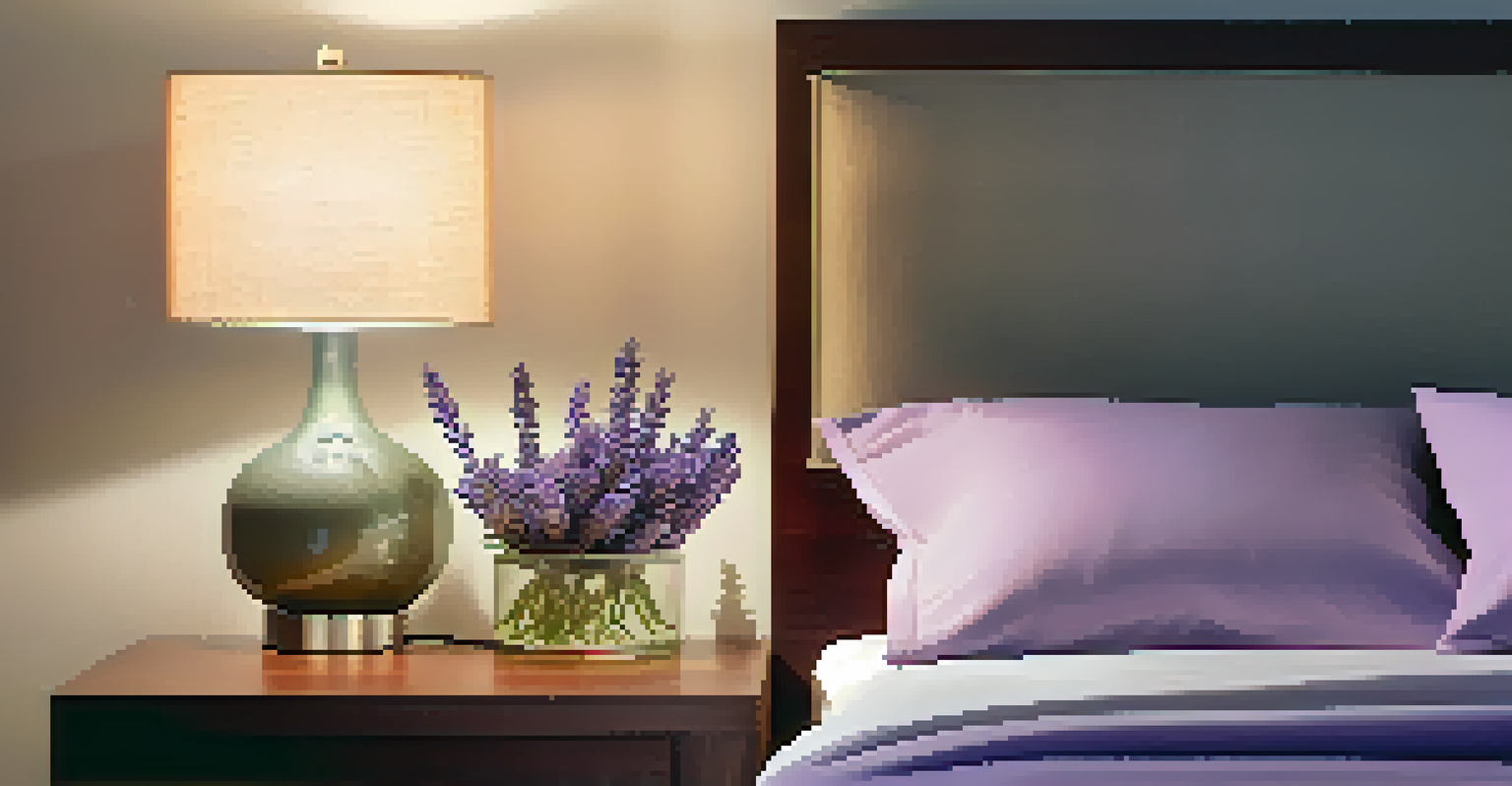The Best Indoor Plants for Improving Sleep Quality at Night

Why Indoor Plants Can Improve Sleep Quality
Indoor plants do more than just beautify your space; they can significantly enhance your sleep quality. Studies show that certain plants release oxygen at night, making the air fresher and more conducive to restful sleep. This improved air quality can help you breathe easier, leading to deeper and more restorative slumber.
Plants improve our surroundings and our health, both physically and emotionally.
Additionally, plants can reduce stress and anxiety, factors that often prevent a good night's sleep. When you surround yourself with greenery, it can create a calming atmosphere, reminiscent of nature. This sense of tranquility can help signal to your body that it’s time to wind down and prepare for rest.
Lastly, having plants in your bedroom can also improve humidity levels. Many indoor plants release moisture into the air, which can prevent dryness that disrupts sleep. By creating a more comfortable environment, you'll be setting the stage for better sleep.
Lavender: Nature's Sleep Aid
Lavender is a well-known herb famous for its soothing scent, which promotes relaxation and sleep. Placing a lavender plant in your bedroom can fill the air with its calming fragrance, helping to lower heart rates and reduce anxiety. This makes it easier to drift off into a peaceful sleep.

Studies have shown that the aroma of lavender can improve sleep quality and even increase the amount of time spent in deep sleep. Just imagine coming home after a long day and being welcomed by the gentle scent of lavender. It’s like a warm hug that invites you to unwind and relax.
Plants Enhance Sleep Quality
Indoor plants improve air quality and create a calming atmosphere, promoting more restful sleep.
Furthermore, lavender is easy to care for, making it a perfect choice for those who may not have a green thumb. Just a little sunlight and occasional watering will keep your lavender thriving, ensuring it’s always ready to help you settle down for the night.
Snake Plant: The Silent Oxygen Producer
The snake plant, also known as mother-in-law's tongue, is a fantastic option for improving sleep. Unlike most plants that release oxygen during the day, snake plants continue to do so at night. This unique trait makes them perfect for bedrooms, as they ensure a supply of fresh oxygen while you sleep.
The best time to plant a tree was 20 years ago. The second best time is now.
Moreover, snake plants are incredibly low-maintenance, thriving on neglect. This means you can enjoy the benefits of cleaner air without the stress of constant care. Just place them in a spot with indirect light, and they’ll do their thing!
In addition to their air-purifying qualities, snake plants can also help filter out toxins like formaldehyde and benzene. By detoxifying the air, they contribute to a healthier sleep environment, allowing you to breathe easy and sleep soundly.
Peace Lily: A Beautiful Air Purifier
The peace lily is not only stunning with its elegant white blooms, but it's also a powerful air purifier. This plant effectively removes harmful pollutants from your bedroom, creating a healthier environment for sleep. The peace lily thrives in low-light conditions, making it ideal for indoor spaces.
What’s more, peace lilies can help maintain humidity levels, which is beneficial for your skin and airways. A little extra moisture can make a big difference in your comfort while sleeping. It’s like having a natural humidifier that also looks beautiful!
Lavender Promotes Relaxation
The soothing scent of lavender helps reduce anxiety and improves sleep quality, making it a great bedroom addition.
However, be cautious if you have pets, as peace lilies can be toxic if ingested. As long as you keep them out of reach, they can be a wonderful addition to your sleep sanctuary, enhancing both aesthetics and air quality.
Aloe Vera: The Healing Plant
Aloe vera is well-known for its healing properties, but it also has benefits for your sleep. This succulent releases oxygen at night, similar to the snake plant, helping to purify the air while you rest. Its ability to improve air quality can lead to more restful and uninterrupted sleep.
In addition to its air-purifying abilities, aloe vera can help soothe skin irritations and keep your skin hydrated. If you wake up with dry skin, having aloe vera nearby can be a quick remedy. Plus, it’s a visually appealing plant that adds a touch of green to your bedroom.
Caring for aloe vera is straightforward, as it requires minimal watering and thrives in bright, indirect sunlight. This makes it a great option for busy individuals who want to enhance their sleep environment without a lot of fuss.
Spider Plant: The Resilient Air Cleaner
Spider plants are incredibly resilient and easy to grow, making them ideal for anyone looking to improve their sleep environment. They are excellent at removing pollutants from the air, including carbon monoxide and formaldehyde. This means they can help create a cleaner sleeping atmosphere.
Beyond their air-purifying abilities, spider plants are known for their charming green and white striped leaves. They can add a lively touch to your bedroom decor, making your space feel more inviting. Plus, they’re pet-friendly, so you don’t have to worry about your furry friends getting into trouble.
Easy Care for Better Sleep
Choosing low-maintenance plants like snake plants and peace lilies can enhance your sleep environment without added stress.
Spider plants thrive in a variety of lighting conditions, from bright to low light, making them adaptable for any room. With just a little care, your spider plant can flourish, contributing to a healthier and more restful sleep environment.
Jasmine: The Fragrant Sleep Companion
Jasmine is cherished not only for its beautiful flowers but also for its enchanting fragrance, which can help promote better sleep. The sweet scent of jasmine has been found to reduce anxiety and improve sleep quality, making it a lovely addition to your bedroom. Imagine drifting off to sleep while surrounded by its calming aroma.
Research indicates that jasmine can increase the amount of deep sleep you get, which is crucial for overall health and well-being. This means that a jasmine plant may not only help you fall asleep faster but also enhance the quality of your sleep.

Jasmine plants prefer bright, indirect sunlight and regular watering, making them easy to care for. Just a few blooms can fill your room with their delightful scent, creating a peaceful and relaxing atmosphere conducive to sleep.
Tips for Caring for Indoor Plants in Your Bedroom
Caring for indoor plants doesn't have to be overwhelming. Start by choosing plants that suit your lifestyle and the conditions of your bedroom. Consider factors like light levels and humidity to ensure your plants thrive in their new home.
Watering is key to maintaining healthy plants. Remember, overwatering can be just as harmful as underwatering. A good rule of thumb is to check the top inch of soil; if it feels dry, it’s time to water. This simple habit can keep your plants flourishing and your air clean.
Finally, don’t forget to rotate your plants occasionally to ensure even growth. By giving them a little time in the sunlight, you’ll help them thrive and continue to contribute to your sleep quality. With just a bit of attention, your indoor plants can become a beautiful and beneficial part of your nighttime routine.